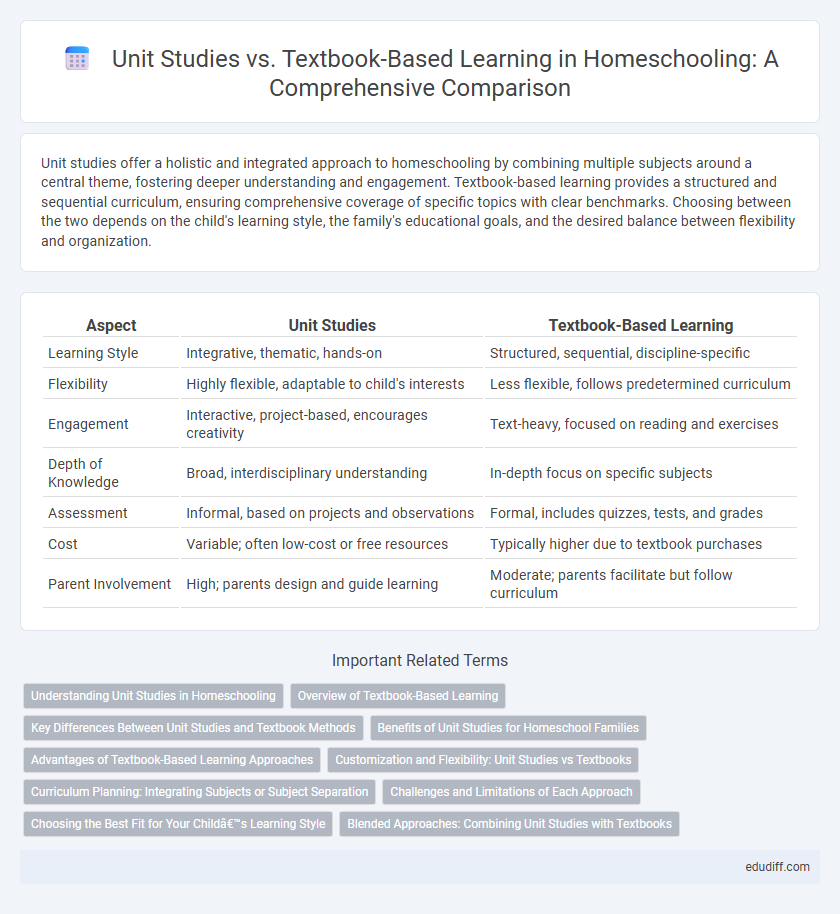Unit studies offer a holistic and integrated approach to homeschooling by combining multiple subjects around a central theme, fostering deeper understanding and engagement. Textbook-based learning provides a structured and sequential curriculum, ensuring comprehensive coverage of specific topics with clear benchmarks. Choosing between the two depends on the child's learning style, the family's educational goals, and the desired balance between flexibility and organization.
Table of Comparison
| Aspect | Unit Studies | Textbook-Based Learning |
|---|---|---|
| Learning Style | Integrative, thematic, hands-on | Structured, sequential, discipline-specific |
| Flexibility | Highly flexible, adaptable to child's interests | Less flexible, follows predetermined curriculum |
| Engagement | Interactive, project-based, encourages creativity | Text-heavy, focused on reading and exercises |
| Depth of Knowledge | Broad, interdisciplinary understanding | In-depth focus on specific subjects |
| Assessment | Informal, based on projects and observations | Formal, includes quizzes, tests, and grades |
| Cost | Variable; often low-cost or free resources | Typically higher due to textbook purchases |
| Parent Involvement | High; parents design and guide learning | Moderate; parents facilitate but follow curriculum |
Understanding Unit Studies in Homeschooling
Unit studies in homeschooling integrate multiple subjects around a central theme, promoting deeper comprehension and real-world connections. This approach encourages hands-on activities, critical thinking, and personalized learning experiences that align with a child's interests and strengths. Compared to textbook-based learning, unit studies often enhance engagement and retention by making education more interdisciplinary and relevant.
Overview of Textbook-Based Learning
Textbook-based learning in homeschooling provides a structured curriculum with clearly defined lessons, objectives, and assessments, allowing for systematic coverage of subjects. It offers consistency and ease of use for parents seeking a straightforward approach to tracking progress and ensuring mastery of core concepts. This method often emphasizes rote memorization, sequential skill development, and standardized testing aligned with educational standards.
Key Differences Between Unit Studies and Textbook Methods
Unit studies integrate multiple subjects around a central theme, promoting interdisciplinary learning and critical thinking, while textbook-based methods follow a structured, subject-specific curriculum with sequential lessons. Unit studies offer flexibility and adaptability to a child's interests and pace, in contrast to the rigid, pre-planned nature of textbook programs. Assessment in unit studies often involves project-based evaluations, whereas textbook approaches rely on quizzes and standardized testing to measure progress.
Benefits of Unit Studies for Homeschool Families
Unit studies promote deep understanding by integrating multiple subjects around a central theme, enhancing critical thinking and retention in homeschool families. This approach encourages hands-on, real-world learning experiences, fostering creativity and independent inquiry among students. Flexibility in pacing and materials allows parents to tailor lessons to their child's interests and learning style, resulting in more engagement and motivation.
Advantages of Textbook-Based Learning Approaches
Textbook-based learning in homeschooling provides a structured curriculum with clear, sequential lessons that facilitate consistent knowledge acquisition and standardized assessment. This approach ensures comprehensive coverage of core subjects, making it easier for parents to track progress and maintain educational standards. Textbooks also offer curated content vetted by educational experts, supporting reliable and focused instruction.
Customization and Flexibility: Unit Studies vs Textbooks
Unit studies offer unparalleled customization and flexibility by integrating multiple subjects around a central theme, allowing homeschoolers to tailor lessons to their child's interests and learning pace. In contrast, textbook-based learning follows a fixed curriculum with predetermined scope and sequence, which limits adaptation and responsiveness to individual needs. This flexibility makes unit studies highly effective for fostering engagement and accommodating diverse learning styles in homeschooling environments.
Curriculum Planning: Integrating Subjects or Subject Separation
Unit studies promote curriculum planning by integrating subjects around a central theme, enhancing interdisciplinary learning and critical thinking. Textbook-based learning relies on subject separation, providing structured and sequential content specific to each discipline. Homeschoolers benefit from selecting methods aligned with their educational goals, balancing flexibility and academic rigor.
Challenges and Limitations of Each Approach
Unit studies often struggle with inconsistent pacing and difficulty covering all required subjects thoroughly, which can lead to gaps in foundational knowledge. Textbook-based learning may cause student disengagement due to its rigid structure and lack of real-world application, limiting creativity and critical thinking development. Both approaches require careful balancing of curriculum goals and individual learning needs to effectively address their inherent limitations.
Choosing the Best Fit for Your Child’s Learning Style
Unit studies foster interdisciplinary connections by integrating multiple subjects around a central theme, promoting deeper engagement for children who learn best through hands-on and creative methods. Textbook-based learning offers structured, sequential content ideal for learners who benefit from clear guidelines and repetitive practice. Assessing your child's preferences for exploration versus routine helps determine which approach maximizes comprehension and retention.
Blended Approaches: Combining Unit Studies with Textbooks
Blended approaches to homeschooling merge the thematic, student-driven exploration of unit studies with the structured, sequential progression of textbook-based learning, enhancing both engagement and comprehension. This method allows families to tailor education by using textbooks to provide foundational knowledge and unit studies to deepen understanding through interdisciplinary projects and real-world applications. Research indicates that combining these approaches supports diverse learning styles and promotes critical thinking skills, resulting in a more personalized and effective homeschool experience.
Unit Studies vs Textbook-Based Learning Infographic

 edudiff.com
edudiff.com